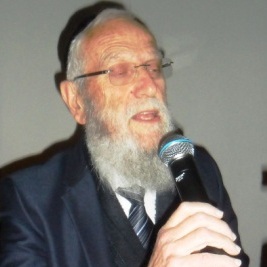
Jewish News

Get refusals: Only so much the Beth Din can do
SUZANNE BELLING
PHOTOGRAPHS BY SUZANNE BELLING
Pictured Rosh Beth Din Rabbi Moshe Kurtstag.
She was speaking at a panel discussion on the subject arranged by Go Getters, the Union of Jewish Women, the Hebrew Order of David, Koleinu and Shalom Bayit at the HOD in Orchards, last Tuesday.
Go Getters was set up after some women wanted to support a Cape Town woman who had been refused a get by her husband, Anthony Sherman. Halachically it means that the couple are still married. Halachically also, if a woman has a child before receiving her get, her new offspring is considered a mamzer (a bastard in Jewish law).
In spite of pressure socially and from the Beth Din over a long period, Sherman, the man in question, has persisted in his refusal, in spite of recently being “named and shamed” by the Beth Din. This has involved placing him in “cherem”, meaning he cannot attend synagogue or be buried in a Jewish cemetery – and includes him attending his son’s barmitzvah later this year.
Sherman has so far ignored all the pressure and requests from the head of Beth Din, Rabbi Moshe Kurtstag, that he meet with the Rabbi. Sherman is also now married civilly to a non-Jewish woman, with whom he has had children.
While Sherman threatened to go to a Reform temple instead, Rabbi Kurtstag said that after consultation with the Progressive Movement, they also agreed to honour the cherem and not accept him.
Speaking at the panel discussion, Rabbi Kurtstag said the ideal scenario would be to have no divorces, but they are permissible in halacha and do require the husband to give the get voluntarily and the wife to accept it.
South African divorce law was amended in the 1990s at the initiative of the late Chief Rabbi Cyril Harris zt”l and Rabbi Kurtstag. The law now allows a civil court to delay granting a divorce order until the parties have arranged a religious divorce, if one of them requests it.
Sherman’s wife, however, had not requested this and the civil divorce was finalised, leaving her a “chained woman”.
Rabbi Kurtstag said under the circumstances, there was little the Beth Din could do, other than the naming and shaming, including publicity. In Israel, by contrast, the courts could and do jail get offenders.
There is also sometimes a problem when a wife refuses to accept a get. In this case, there is a possible solution – obtaining the consent of 100 rabbis, allowing the husband to marry again, as in early times, technically a husband could marry more than one wife, as in the case of Jacob and Leah and Rachel.
But polygamous marriages have been prohibited among Ashkenazi Jews for over 1 000 years by Rabbeinu Gershom and, under Israeli law, more recently for Sephardim.
Rabbi Kurtstag said the refusal to give and receive a get was “abuse”.
Liza Segal, a divorce lawyer and mediator, gave the legal background to the situation in this country, saying the amendment to the Divorce Act did not solve the problem of a “lawless” husband who did not care whether a divorce order was granted or not.
Bev Goldman of the Union of Jewish Women, who chaired the panel, said a Jew in South Africa has two marriage ceremonies, civil and religious.
“But the very special binding one is the Jewish ceremony, during which the ketubah – the Jewish marriage contract – is signed.” This includes all the obligations the husband has towards his wife.
Blumenau Alge reported that, although the naming and shaming had not yet worked in Sherman’s case, it had resulted in at least five other husbands speedily approaching the Beth Din to arrange a get.
—————————————————————————————————————————–
Bad ‘get’ publicity quickly ‘unchained’ Rachel
SUZANNE BELLING
At the panel discussion on the get, Bev Goldman of the UJW read the personal account of Rachel (not her real name), who had been invited to speak, but declined on the advice of her lawyer as her civil divorce was not yet final.
Rachel said: “I approached the Beth Din in 2012. I was asked whether I had done all that was possible to save my marriage – which I had.
“On leaving this meeting, I had a good sense of being understood. The ‘other side’, would be contacted.”
She hoped – vainly – that swift progress would be made. She approached Rosh Beth Din Rabbi (Moshe) Kurtstag after three years to try to get her released from the chains that bound her, “not due to my being in a relationship or wanting to remarry”.
Following a story in the SA Jewish Report and the “seriousness of the Beth Din” in imposing the cherem in the Sherman matter, she still decided not to pursue it further.
“I am of the opinion that the two events coinciding may have caused undue anxiety of public exposure to the other side. Lo and behold, the Beth Din received a phone call on the same day for him to make an appointment for early the following week to write the get.
“I got my get two weeks later.”
Rachel added: “Without the ongoing determination of Rabbi Kurtstag and the Beth Din I would not have my get.
“We are not alone in this ordeal. The very important support system from my dear friends has been tremendous. In the words of Nelson Mandela, ‘it always seems impossible until it is done’.”




